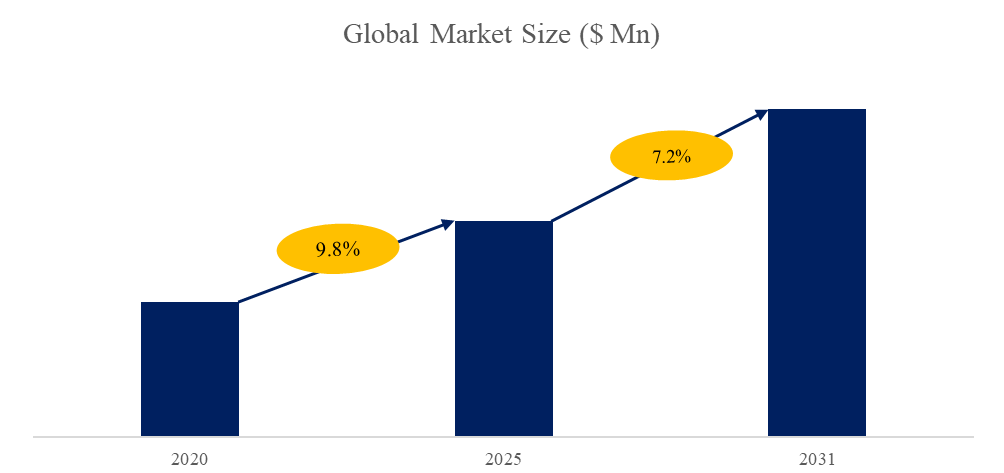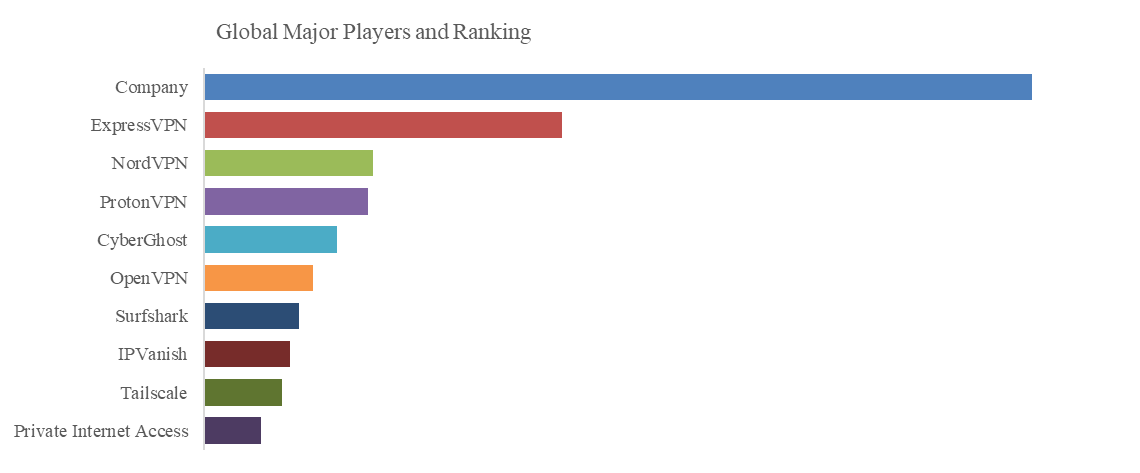VPN Services (Virtual Private Network Services) refer to solutions that allow users to create a secure and encrypted connection over the internet. These services are designed to protect online privacy, enhance security, and bypass geographic restrictions by masking the user’s IP address and routing their internet traffic through a remote server.
According to the new market research report “VPN Services – Global Market Share and Ranking, Overall Sales and Demand Forecast 2025-2031”, published by QYResearch, the global VPN Services market size is projected to grow from USD 2,154.59 million in 2024 to USD 3,500.19 million by 2031, at a CAGR of 7.2% during the forecast period (2025-2031).
Figure00001. Global VPN Services Market Size (US$ Million), 2020-2031

Source: QYResearch, “VPN Services – Global Market Share and Ranking, Overall Sales and Demand Forecast 2025-2031”
Figure00002. Global VPN Services Top 10 Players Ranking and Market Share (Ranking is based on the revenue of 2024, continually updated)

Source: QYResearch, “VPN Services – Global Market Share and Ranking, Overall Sales and Demand Forecast 2025-2031”
According to QYResearch Top Players Research Center, the global key manufacturers of VPN Services include ExpressVPN, NordVPN, ProtonVPN, CyberGhost, OpenVPN, Surfshark, IPVanish, Tailscale, Private Internet Access, PrivadoVPN, etc. In 2024, the global top 10 players had a share approximately 45.5% in terms of revenue.
Main Driving Factors:
1. Growing demand in emerging markets
The demand for cybersecurity services in emerging markets such as Asia Pacific and Latin America is growing rapidly. According to Statista data, the number of global cyber attacks increased by 38% year-on-year in 2022, among which the technology adoption rate in countries such as India and Brazil increased significantly, which promoted the popularity of VPN services. The intensification of digital theft, ransomware attacks and other cyber threats has further strengthened the demand of enterprises for powerful cybersecurity solutions, providing a broad market space for VPN manufacturers.
2. Strategic cooperation and technology integration
The trend of cooperation in the field of cybersecurity is becoming increasingly obvious, and manufacturers achieve technical complementarity and resource sharing through strategic alliances. For example, ExpressVPN and CyberGhost are both under Kape Technologies, while NordVPN and Surfshark merged in 2022. This strong combination not only enhances technical strength, but also expands market influence through joint product development. In the future, more similar cooperation may further promote industry innovation and market share concentration.
3. AI and machine learning empowerment
The application of artificial intelligence (AI) and machine learning (ML) technologies has brought new growth points to VPN services. Through AI-driven threat detection, behavioral analysis, and automated response, VPN vendors are able to provide more efficient and intelligent security solutions, thereby improving user experience and enhancing market competitiveness. In addition, AI technology can also be used to optimize network performance to further meet users’ needs for speed and stability.
4. Policy-driven demand growth
Global regulation of data protection is becoming increasingly stringent, such as the EU’s General Data Protection Regulation (GDPR) and the US’s California Consumer Privacy Act (CCPA). These policies require companies to strengthen data privacy protection, thereby driving demand for VPN services. Manufacturers can further expand their market share among enterprises and individual users by developing products that meet regulatory requirements.
5. Remote work culture development
The normalization of remote work has brought continued growth opportunities for VPN services. According to a Gartner survey, 47% of organizations plan to allow employees to work remotely full-time after the epidemic. This trend has led to a significant increase in demand for secure remote access solutions. VPN, as a core tool to ensure the security of data transmission, will play an important role in this market.
Main Restraint:
1. Intensified market competition
The VPN service market is increasingly competitive, with a continuous influx of emerging vendors and traditional cybersecurity companies, leading to increased price pressure and lower profit margins. In addition, the popularity of free VPN services has further intensified market competition, forcing leading vendors to continue to invest in price, features, and service quality to maintain market share.
2. Rapid evolution of cyber threats
The continuous upgrading of cyber attack methods and technologies, such as the increase in ransomware, zero-day vulnerabilities, and advanced persistent threats (APTs), has forced VPN vendors to accelerate product innovation to remain relevant and effective. This rapidly changing environment places higher demands on vendors’ technology R&D capabilities and resource investment, while also increasing operational pressure.
3. Recession risk
Global economic uncertainty has increased, and global GDP growth has slowed significantly in the past two years. During a recession, companies usually prioritize cutting non-core spending, and cybersecurity budgets may be affected, which will have a negative impact on the market demand for VPN services.
4. Rising regulatory compliance costs
Increasingly stringent data privacy and cybersecurity regulations around the world, such as the implementation of GDPR and CCPA, have imposed high compliance costs on companies. In the future, new regulatory policies may further increase compliance complexity and costs. It is estimated that the compliance costs of enterprises involved in data processing may increase by 15-20%, which poses a challenge to the operational efficiency and profitability of VPN manufacturers.
5. Data Leakage and Trust Crisis
Data leakage incidents (whether by the manufacturer itself or a third-party supplier) may seriously damage brand reputation and customer trust. For example, security vulnerabilities of third-party suppliers may lead to user data leakage, which in turn may lead to legal disputes and user loss. Manufacturers need to strengthen supply chain management and data security measures to reduce such risks.
6. Executive Scandal and Reputation Risk
Executive misconduct may cause a major blow to brand reputation. For example, in 2021, ExpressVPN CIO Daniel Gericke was criminally charged for participating in cyber espionage operations in the UAE. Although the incident occurred before he joined ExpressVPN, it still had a negative impact on the brand image. Such incidents may undermine user trust and thus affect market share.
Industry Development Trends:
1.Increasing Adoption Rates
VPN usage is expected to grow significantly, especially in emerging markets like Asia-Pacific and Latin America, where internet penetration and digital threats are increasing. The shift to remote work post-pandemic has also made VPNs essential for secure access to corporate networks.
2.Market Consolidation and Intensified Competition
Smaller VPN providers may struggle to compete, leading to acquisitions by larger players like Kape Technologies (ExpressVPN, CyberGhost) and Nord Security (NordVPN, Surfshark). The 2022 NordVPN-Surfshark merger exemplifies this trend. Increased competition will push providers to differentiate through advanced features and pricing strategies.
3.Emergence of New Protocols
Protocols like WireGuard are gaining traction due to their lightweight design and superior performance. Open-source alternatives are also emerging, offering transparency and customization. The adoption of these protocols could disrupt the competitive landscape, favoring providers that integrate them early.
4.Increased Government Regulation
Regulatory measures, such as India’s VPN registration rules and Russia’s VPN bans, are likely to expand. These regulations could complicate operations for VPN providers, especially in restrictive markets, while also creating opportunities for providers that can navigate compliance challenges effectively.
About QYResearch
QYResearch founded in California, USA in 2007.It is a leading global market research and consulting company. With over 17 years’ experience and professional research team in various cities over the world QY Research focuses on management consulting, database and seminar services, IPO consulting (data is widely cited in prospectuses, annual reports and presentations), industry chain research and customized research to help our clients in providing non-linear revenue model and make them successful. We are globally recognized for our expansive portfolio of services, good corporate citizenship, and our strong commitment to sustainability. Up to now, we have cooperated with more than 60,000 clients across five continents. Let’s work closely with you and build a bold and better future.
QYResearch is a world-renowned large-scale consulting company. The industry covers various high-tech industry chain market segments, spanning the semiconductor industry chain (semiconductor equipment and parts, semiconductor materials, ICs, Foundry, packaging and testing, discrete devices, sensors, optoelectronic devices), photovoltaic industry chain (equipment, cells, modules, auxiliary material brackets, inverters, power station terminals), new energy automobile industry chain (batteries and materials, auto parts, batteries, motors, electronic control, automotive semiconductors, etc.), communication industry chain (communication system equipment, terminal equipment, electronic components, RF front-end, optical modules, 4G/5G/6G, broadband, IoT, digital economy, AI), advanced materials industry Chain (metal materials, polymer materials, ceramic materials, nano materials, etc.), machinery manufacturing industry chain (CNC machine tools, construction machinery, electrical machinery, 3C automation, industrial robots, lasers, industrial control, drones), food, beverages and pharmaceuticals, medical equipment, agriculture, etc.
Contact Us:
If you have any queries regarding this report or if you would like further information, please contact us:
QY Research Inc.
Add: 17890 Castleton Street Suite 369 City of Industry CA 91748 United States
E-mail: global@qyresearch.com
Tel: 001-626-842-1666(US) 0086-133 1872 9947(CN)
EN: https://www.qyresearch.com
JP: https://www.qyresearch.co.jp
